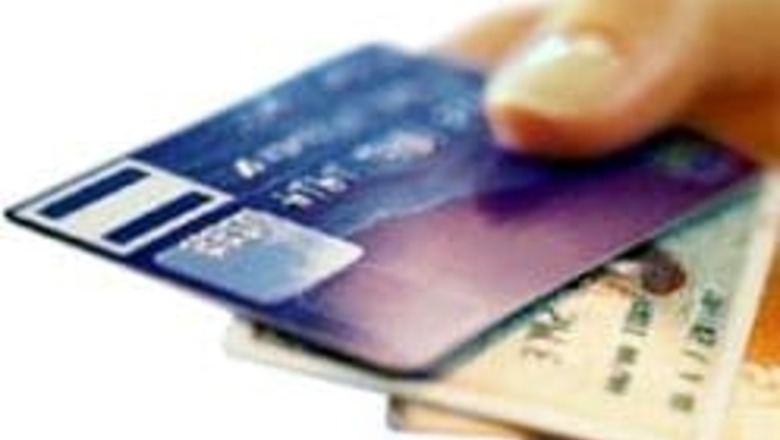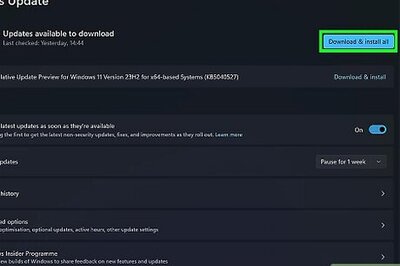
views
New Delhi: The weakening of the rupee to Rs 50 levels against the US dollar has made your foreign holiday costlier.
How, you ask? If you were planning to spend USD 1,000 on shopping, local sight seeing, it would have cost you Rs 40,000 a few months back. But, today, the bill is nothing less than Rs 50,000!
Nevertheless, if your heart is set on a vacation you have some smart options:
- international credit cards
- prepaid forex cards These options are safer and much convenient. And, if the swinging rupee is giving you the jitters, wealth tells you which among these options can ease the stress. International credit cards International credit cards are used abroad. The card charges foreign exchange rates as on the day of the transaction. That is, if you purchase something on, say, November 20, the foreign exchange rate as on that date would be applied when you are billed. Features 1. International credit cards can be used in any country as long as vendors accept credit cards 2. International card has a credit limit, ie, you cannot exceed that amount. Prepaid forex cards Prepaid forex card works more like a prepaid phone connection, ie, you load Rs 100 in advance to make calls worth Rs 100 less tax. You pay cash across the counter and you get a prepaid forex card. It’s as simple as that. The prepaid forex card takes into account the foreign exchange rates on the day you load the card and not on the day you make purchases. That is, say, you plan to load your prepaid card on November 25, the forex rates applicable would be the rates prevalent on November 25. Features 1. You don’t need to have an account with a particular bank to buy a prepaid forex card. 2. The transaction amount is immediately deducted from your balance amount when prepaid forex card is used. 3. Prepaid forex cards are available only in certain currencies -- Australian Dollar, Canadian Dollar, US Dollar, Swiss Franc, Euro, GBP, etc. 4. You can reload the prepaid card. 5. There are certain charges for which your prepaid card cannot be used like hotels, hiring of cars, etc. Tip: If you are going to spend in a particular currency, say USD, buy a USD prepaid forex card. If you buy a USD prepaid forex card, but spend in another currency, say pounds or euros, you will be acharged a fee. Currency fluctuations and cards Scenario one: Rupee appreciates If you buy a prepaid card today (when the rupee is at Rs 50 to a dollar), all your purchases will be made at that rate. So, if the rupee appreciates to Rs 45 at the time when you travel, you lose. If you have a credit card, you will get the advantage of the lower rate for your purchases. Scenario two: Rupee depreciates If you buy a prepaid card today (when the rupee is at Rs 50 to a dollar), all your purchases will be made at that rate. So, if the rupee depreciates to Rs 55 at the time when you travel, you gain. If you have a credit card, you will have to shell out a higher rate. The better option, today? It's difficult to tell. Economists are divided on how much the rupee will move over the next 3 - 6 months. However, wealth suggests that if you have a pre-decided travel budget (we recommend a budget too!) and want to remain within that, you can opt for the prepaid card.
Where do you buy these cards
I need an international credit/debit card
All credit cards issued by banks are internationally accepted. To apply for a card: you need to fill the bank's application form, submit two latest salary slips, copy of Income Tax return, residence proof, and identity proof. Most banks, usually, issue a credit card within 20 days of applying.
I need a prepaid card!
There are three banks that offer prepaid forex card -- ICICI Bank Travel Card, HDFC Bank’s ForexPlus Card and SBI’s Vishwa Yatra foreign travel card.
The procedure to get a card is pretty simple. Pick a form from one of the bank’s branches where they are available. Submit the A2 form, a photocopy of your current passport, photocopy of PAN card (if the amount exceeds Rs 50,000), and the amount. Banks, usually, activate the card once you give them the fund.
Reloading! How do I do that?
If you need to reload your prepaid card while you are still abroad, it could be a hassle as you cannot reload online. You need to ask your friends/family to reload your card from India. While reloading, they’ll be required to submit a photocopy of your current passport, photocopy of PAN card and the reload form.
And, in case of excess balance, you could encash the balance in the country you took the card.
What’s on your platter?
Table below shows various charges for USD prepaid forex card:
- This charge is applicable for those who do not have an account with the bank.
- Service charge extra
With HDFC Bank, you have a per day limit of USD 3,000 -- cash withdrawal of USD 2,000 per day and purchases for USD 1,000 per day. ICICI Bank has a cash withdrawal limit of USD 2,000 per day, while SBI has a maximum cash withdrawal of USD 1,000 per day.
Sachin Khandelwal, Head-Credit Cards, ICICI Bank says," Its a brilliant product to be used at all times, at all places. A smart thing to do would be to use the card in the country of origin, ie, use a USD Card in the US only and not in the UK. In case passenger is travelling to UK, a GBP card could also be purchased. This would save him from the cross currency charges, thus making the card very economical to use."
What are the things you should know before use:
There are a lot of hidden costs on that credit card you own and if you aren't watchful enough, your monthly statement may shock you.
Here is a checklist on when and how your lender can slash you with charges.
You have an overdue payment
If you don't settle the minimum amount due by the due date, you would end up paying a late payment fee. This fee varies from bank to bank.
What if you don't pay your minimum amount due for two consecutive months? You become a defaulter. The course of action after that depends on the outstanding amount on your card and past track record. The bank will assign you a risk score, depending on which, the collection strategy changes. Also, any further transactions on your card will be blocked.
You revolve your balance
Banks give you this option to pay a minimum amount by the due date and carry forward the rest to the next billing period. In this case, you will pay an interest on the amount that you carry forward.
There's another catch: when you carry a balance from month to month, you do not get any 'interest free' period on new purchases you make.
Your payment cheque bounces
If you pay your bill by cheque and it bounces, you would have to bear a fee for dishonoured cheques. Also, if this payment is made very close to or after the due date, you might be in for more trouble.
The bank may not only increase your risk profile but also beyond the due date, you will have to bear all sorts of charges. This means, a fee for a bounced cheque plus a late payment fee and also a monthly interest on the outstanding amount!


















Comments
0 comment